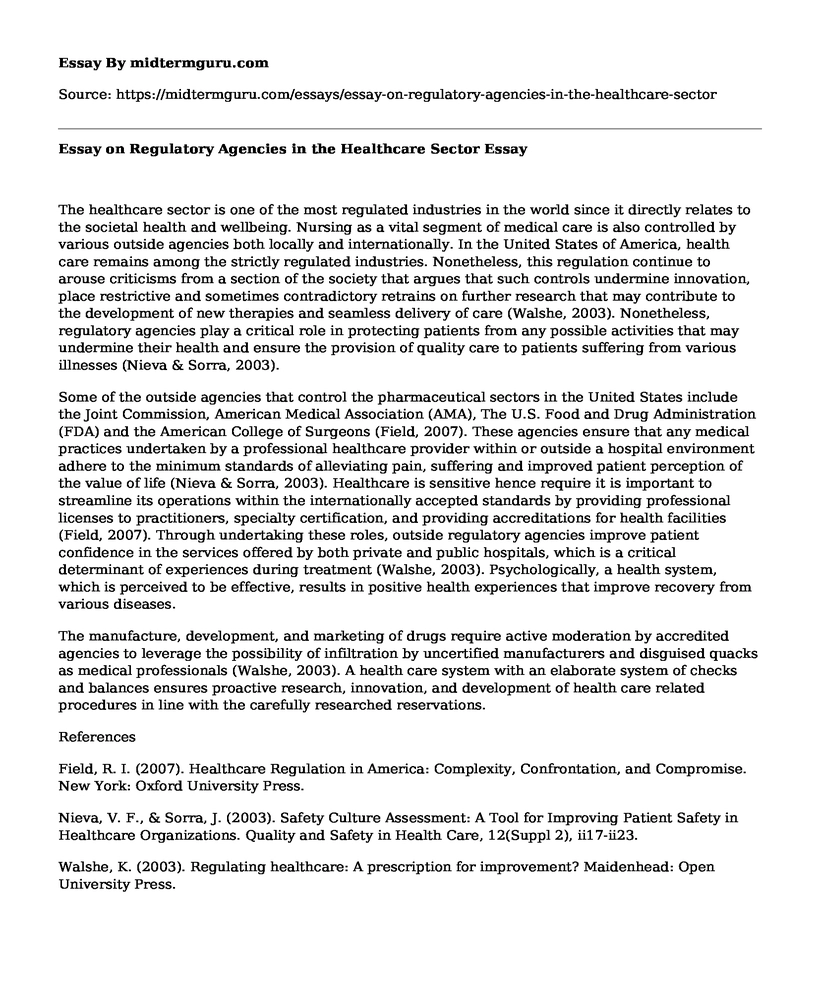The healthcare sector is one of the most regulated industries in the world since it directly relates to the societal health and wellbeing. Nursing as a vital segment of medical care is also controlled by various outside agencies both locally and internationally. In the United States of America, health care remains among the strictly regulated industries. Nonetheless, this regulation continue to arouse criticisms from a section of the society that argues that such controls undermine innovation, place restrictive and sometimes contradictory retrains on further research that may contribute to the development of new therapies and seamless delivery of care (Walshe, 2003). Nonetheless, regulatory agencies play a critical role in protecting patients from any possible activities that may undermine their health and ensure the provision of quality care to patients suffering from various illnesses (Nieva & Sorra, 2003).
Some of the outside agencies that control the pharmaceutical sectors in the United States include the Joint Commission, American Medical Association (AMA), The U.S. Food and Drug Administration (FDA) and the American College of Surgeons (Field, 2007). These agencies ensure that any medical practices undertaken by a professional healthcare provider within or outside a hospital environment adhere to the minimum standards of alleviating pain, suffering and improved patient perception of the value of life (Nieva & Sorra, 2003). Healthcare is sensitive hence require it is important to streamline its operations within the internationally accepted standards by providing professional licenses to practitioners, specialty certification, and providing accreditations for health facilities (Field, 2007). Through undertaking these roles, outside regulatory agencies improve patient confidence in the services offered by both private and public hospitals, which is a critical determinant of experiences during treatment (Walshe, 2003). Psychologically, a health system, which is perceived to be effective, results in positive health experiences that improve recovery from various diseases.
The manufacture, development, and marketing of drugs require active moderation by accredited agencies to leverage the possibility of infiltration by uncertified manufacturers and disguised quacks as medical professionals (Walshe, 2003). A health care system with an elaborate system of checks and balances ensures proactive research, innovation, and development of health care related procedures in line with the carefully researched reservations.
References
Field, R. I. (2007). Healthcare Regulation in America: Complexity, Confrontation, and Compromise. New York: Oxford University Press.
Nieva, V. F., & Sorra, J. (2003). Safety Culture Assessment: A Tool for Improving Patient Safety in Healthcare Organizations. Quality and Safety in Health Care, 12(Suppl 2), ii17-ii23.
Walshe, K. (2003). Regulating healthcare: A prescription for improvement? Maidenhead: Open University Press.
Cite this page
Essay on Regulatory Agencies in the Healthcare Sector. (2021, Jul 01). Retrieved from https://midtermguru.com/essays/essay-on-regulatory-agencies-in-the-healthcare-sector
If you are the original author of this essay and no longer wish to have it published on the midtermguru.com website, please click below to request its removal:
- Paper Example on American Red Cross Agency
- 25 Years of Improving Community Health Through Collaboration - Essay Sample
- 2020 Cardiovascular Disease Stats: US Death Rates Remain High - Essay Sample
- Optimizing Patient Flow: IT & Process Management for Quality Care - Essay Sample
- Bob Selling Unapproved Drugs to US Consumers: Potential Harms - Essay Sample
- Unraveling the Role of Genomics in Diagnosing Degenerative Diseases - Research PAper
- Clinician's Unique Skill: Understanding Patient Goals & Prognosis - Essay Sample







